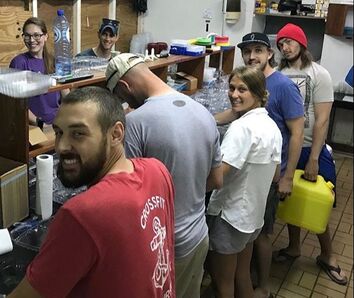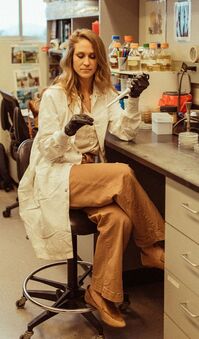|
PhD Research:
Many bottom-dwelling marine organisms such as corals, tubeworms, mollusks and sea urchins reproduce by releasing gametes into the water column. There, the larvae develop and swim, eventually looking for a place to permanently settle down onto the submerged surfaces. For nearly a century, studies have shown how marine microbes can influence the settlement and metamorphosis of these organisms, providing a cue to indicate a suitable environment for metamorphosis. My PhD work aimed to identify the underlying genes responsible for the induction of metamorphosis in marine invertebrates. In Alker et al. 2020, we explored a model marine bacteria and show it encodes two different metamorphosis-inducing gene clusters. We currently have a manuscript in preparation that developing a modular plasmid toolkit for higher throughput genetic manipulation of non-model marine bacteria and applies it to functionally link chemical biosynthesis genes in a marine bacteria with coral metamorphosis. |
Research Experience
Postdoctoral Researcher | University of California, Berkeley Jan. 2023- Jan. 2025
Berkeley, CA
Mentors: Ben E. Rubin & Jennifer A. Doudna
Project(s): Increasing editing efficiency with Cas-associated Transposons using host transposition factors & Microbiome editing in anaerobic lignin-degrading microbial communities
Research Specialist | San Diego State University (SDSU) Oct. 2022-Dec. 2022
San Diego, CA
Mentor: Nicholas Shikuma | Modular genetic tool development and application
Project(s): Development and applications of a modular plasmid toolkit reveal new functional insights about bacteria-stimulated metamorphosis in tubeworms and coral
Graduate Researcher | San Diego State University (SDSU) Sept. 2016-Sept. 2022
San Diego, CA
Mentor: Nicholas Shikuma | Bacterial genetics and beneficial host-microbe interactions
Project(s): Bacterial settlement cues and how they influence animal metamorphosis
Graduate Research Intern | Smithsonian Research Station May 2021- June 2021
Graduate Research Internship Program funded by NSF
Fort Pierce, FL
Mentor: Valerie Paul | Chemical ecology and coral probiotics
Project: The genetic investigation of protein and chemical bacterial settlement cues and their influence on coral metamorphosis
Intern and Lab Technician | Harbor Branch Oceanographic Institute Jan. 2013- June 2016
Fort Pierce, FL
Mentor: Joshua Voss
Project: Investigating the bacterial communities in the mucus of diseased and healthy corals in the Flower Garden Banks National Marine Sanctuary.
Research Experience for Undergraduates (REU) Intern | Bermuda Institute of Ocean Sciences Aug. 2013- Nov. 2013
St. George’s, Bermuda
Mentor: Rachel Parsons
Project: Investigating antibiotic resistance in bacteria near a sewage outfall in Bermuda
Berkeley, CA
Mentors: Ben E. Rubin & Jennifer A. Doudna
Project(s): Increasing editing efficiency with Cas-associated Transposons using host transposition factors & Microbiome editing in anaerobic lignin-degrading microbial communities
Research Specialist | San Diego State University (SDSU) Oct. 2022-Dec. 2022
San Diego, CA
Mentor: Nicholas Shikuma | Modular genetic tool development and application
Project(s): Development and applications of a modular plasmid toolkit reveal new functional insights about bacteria-stimulated metamorphosis in tubeworms and coral
Graduate Researcher | San Diego State University (SDSU) Sept. 2016-Sept. 2022
San Diego, CA
Mentor: Nicholas Shikuma | Bacterial genetics and beneficial host-microbe interactions
Project(s): Bacterial settlement cues and how they influence animal metamorphosis
- Performed bacterial genetics on model and non-model bacteria to the role of chemicals, proteins, and other products capable of inducing metamorphosis in invertebrate animals
- Cultured tubeworm, Hydractinia, and coral larvae and performed metamorphosis assays
Graduate Research Intern | Smithsonian Research Station May 2021- June 2021
Graduate Research Internship Program funded by NSF
Fort Pierce, FL
Mentor: Valerie Paul | Chemical ecology and coral probiotics
Project: The genetic investigation of protein and chemical bacterial settlement cues and their influence on coral metamorphosis
- Generated tractable strain of Pseudoalteromonas bacteria (induces coral metamorphosis) and a knockout strain of tetrabromopyrrole (did not induce metamorphosis) and confirmed strains with LC-MS/MS
- Cultured coral larvae (Porites astreoides and Diploria labyrinthiformes) and performed biofilm metamorphosis assays
Intern and Lab Technician | Harbor Branch Oceanographic Institute Jan. 2013- June 2016
Fort Pierce, FL
Mentor: Joshua Voss
Project: Investigating the bacterial communities in the mucus of diseased and healthy corals in the Flower Garden Banks National Marine Sanctuary.
- Collected and processed coral samples including preparation for RNA sequencing, extraction of zooxanthellae, chlorophyll analysis and bacterial DNA extraction from coral mucus.
Research Experience for Undergraduates (REU) Intern | Bermuda Institute of Ocean Sciences Aug. 2013- Nov. 2013
St. George’s, Bermuda
Mentor: Rachel Parsons
Project: Investigating antibiotic resistance in bacteria near a sewage outfall in Bermuda
- Utilized classic microbiological techniques and PCR screening to analyze water samples
Research Techniques
Bacterial Genetics
- Adapted a broad host range plasmid toolkit including gene knockdown with CRISPRi
- Development of new transposon parts for in cis manipulation (Alker et al. 2022, in preparation)
- Gene deletions using double homologous recombination
- Golden Gate and Gibson plasmid assemblies
- Whole genome and metagenomic sequencing and analysis (galaxy, PATRIC)
- Comparative genomics- gene syntenies, pangenomics (Anvi'o)
- Phylogenomics (PhyML)
- Model organisms: Tubeworm (Hydroides elegans) and Hydractinia symbiolongicarpus larval culture and metamorphosis assays
- Non-model organisms: Hard corals (Porites astreoides, Diploria labyrinthiformes, Colpophyllia natans) larval culture and metamorphosis
- Bacterial and algal culture
- Organic extraction and QToF LC-MS/MS analysis of bacterial secondary metabolites
- Silica Columns
Computing Skills
Github: https://github.com/Aalker
Limited experience with:
Limited experience with:
- R programming language
- Unix terminal and command line
- Adobe Creative Cloud: Photoshop and Illustrator
- Running Python-dependent programs
- Anvi'o - An analaysis and visualization platform for 'Omics data
- PhyML- Phylogenies
- EasyFig2.2.2- Gene Syntenies
- Bowtie2- Mapping
- PATRIC- GUI 'omics data analysis platform
- Galaxy- GUI 'omics data analysis platform
Workshops
SECORE coral larval spawning. Sponsored academic participant. CARMABI, Curaçao. 2018.
PATRIC Bioinformatics analysis platform. ASM Microbe 2018.
Using Anvi'o for metagenomic analysis. UC Irvine. 2017.
Metagenomic assembly and annotation workshop. SDSU. 2016
PATRIC Bioinformatics analysis platform. ASM Microbe 2018.
Using Anvi'o for metagenomic analysis. UC Irvine. 2017.
Metagenomic assembly and annotation workshop. SDSU. 2016
Field Experience
 2018 SECORE coral larval workshop at CARMABI, Curaçao
2018 SECORE coral larval workshop at CARMABI, Curaçao
American Academy of Underwater Sciences Scuba Certified (2014- present)
- Smithsonian Marine Station. Coral metamorphosis assays (2021)
- SECORE coral larval workshop. Larval gamete collection and night diving (2018)
- Bermuda Institute of Ocean Sciences. Summer research intern and coral collections (2017)
- Carrie Bow Cay (Smithsonian). Sample collection of mesophotic and shallow corals (2016)
- (2) Cruises to the Flower Garden Banks National Marine Sanctuary aboard the r/v Manta. Safety diver and sample collections. (2015-2016)
- Monthly dives to St. Lucie Reef (Florida) (2014-2016)

